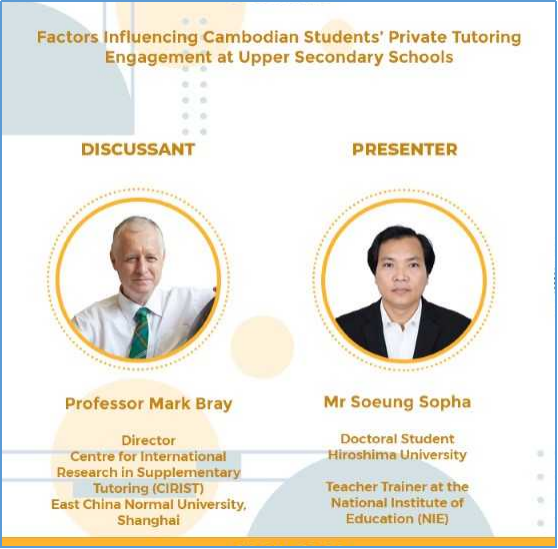Private Supplementary Tutoring in Cambodia
2022-08-29
Prof. Mark Bray has recently been the Discussant for a presentation entitled ‘Factors Influencing Cambodian Students’ Private Tutoring Engagement at Upper Secondary Schools’. The seminar was presented by Mr Soeung Sopha, and hosted by the Cambodia Development Resource Institute (CDRI) on 26 August 2022.
 Mark Bray’s history of empirical research in Cambodia stretches for a quarter of a century. His work for UNESCO and UNICEF in the 1990s led to a book published in 1999 by UNESCO’s International Institute for Educational Planning (IIEP). The book was entitled The Private Costs of Public Schooling: Household and Community Financing of Primary Education in Cambodia. Expenditures on private tutoring were among the striking components of those household costs.
Mark Bray’s history of empirical research in Cambodia stretches for a quarter of a century. His work for UNESCO and UNICEF in the 1990s led to a book published in 1999 by UNESCO’s International Institute for Educational Planning (IIEP). The book was entitled The Private Costs of Public Schooling: Household and Community Financing of Primary Education in Cambodia. Expenditures on private tutoring were among the striking components of those household costs.
This book was followed by another in 2005, co-authored with Seng Bunly and entitled Balancing the Books: Household Financing of Basic Education in Cambodia. The research was conducted under the auspices of the World Bank, repeating the earlier sample survey of primary schools and adding lower secondary schools.

Then in the mid-2010s Mark Bray returned to Cambodia to examine patterns in Grades 9 and 12. Among publications, co-authored with CIRIST members Zhang Wei and Liu Junyan, are articles in the International Journal of Educational Development (2016) and the Journal of Curriculum Studies (2018).
These historical perspectives greatly assisted Mark Bray in his role for the CDRI seminar. Seoung Sopha had collected data on tutoring provided by serving teachers, highlighting some of the ethical issues that arose when such teachers tutored their existing students. The seminar heard about the justifications given by teachers for such activities, including supplementing their salaries and completing the curriculum during a tight school day. It also heard the perspectives of students, including the pressures they felt from the teachers in what can be called “a privatized component of the public system”.
Cambodia patterns also show the resilience of private tutoring despite government policies that to reduce or remove it. Once such practices become engrained in the culture, Prof. Bray remarked, they are very difficult to eliminate. Thus, even if official policies sanction such tutoring, much continues underground. Analysis of the Cambodian picture contributes usefully to the international picture as well as to the national one.